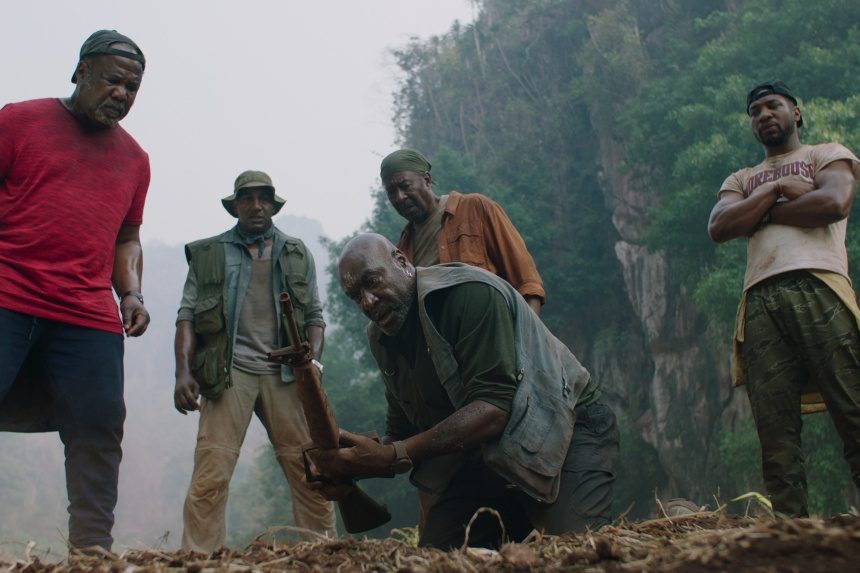Da 5 Bloods
⭐ ⭐ ⭐ ⭐
Rating: R
Run Time: 2 hours 34 minutes
Stars: Delroy Lindo, Jonathan Majors, Clarke Peters, Norm Lewis, Isiah Whitlock Jr., Chadwick Boseman
Writers: Danny Bilson, Paul De Meo, Kevin Willmott, Spike Lee
Director: Spike Lee
Among the most thoughtful, riveting war movies of any year, Spike Lee’s searing story of four Black Vietnam War vets who return to Southeast Asia to clean up some unfinished business made a brief splash when it arrived on Netflix in June, but deserves a second look now that the belated awards season is here.
We meet the men in a plush hotel lobby in present-day Ho Chi Minh City, a garish real-life parody of communist/corporate excess. Way back in the days when this place was known as Saigon, the four came to call themselves Da 5 Bloods — a number that at the time included their platoon officer, a Malcolm X-quoting intellectual nicknamed Stormin’ Norman. He was killed in battle, and the grieving survivors were forced to leave him behind, buried in the mountains.
Now, decades later, the Bloods have told friends and neighbors they’re on a mission to find Norman’s remains and return them to his family, but that’s exactly half the story: They’re also planning to dig up a literal treasure chest of gold bullion — originally intended as payment from the U.S. government to Vietnamese collaborators — that they’d found on a crashed transport plane. The Bloods buried that, too, not far from Norman’s hastily excavated grave.
It’s a crackerjack set-up, just the sort of plot you’d expect as a vehicle for Bruce Willis. And, indeed, this film’s script started out as a standard-issue Hollywood action movie. Miraculously, it ended up in the hands of Lee, one of our most inventive and resourceful filmmakers, who took the bare bones of a caper film and layered upon it issues ranging from America’s historic willingness to send Black soldiers to defend freedoms they do not themselves enjoy to survivor’s guilt to the continuing threat of buried landmines in former war zones.
And all the while, while deftly shifting his spotlight among the various issues he wants us to consider, Lee never misses a beat in relating a pulse-pounding narrative of adventure, double-dealing, comradeship and, at times, horrific, out-of-nowhere violence (a warning regarding that: Besides copious amounts of movie blood and carnage, Lee sometimes lingers on grisly photos of actual wartime atrocities involving men, women, and children).
To be sure, Lee’s monumental task is made easier by his utterly committed ensemble. Delroy Lindo (Get Shorty), Clarke Peters (The Wire), Norm Lewis (Scandal) and Isiah Whitlock Jr. (BlacKkKlansman) are the Bloods, men who have achieved varying levels of success in their lives, but all of whom remain scarred by their experiences in ‘Nam. They tussle like kids and fight like brothers, at times seething with resentment toward society — and sometimes each other.
As Paul, the vet with the deepest psychic wounds, Lindo does the heaviest lifting. Alternately laughing, snarling and sobbing, Lindo embodies a man paralyzed by guilt, roiling with suspicion, broken by racism, and tortured by a deeply troubled relationship with his son David (Jonathan Majors), who has unexpectedly tagged along for the expedition to Vietnam’s interior. Indeed, Lee has in some ways overburdened the character of Paul, asking him to swing from one grand emotion to another, leaving us to wonder where the core of his true personality lies. Lindo, however, never lets us lose sight of Paul’s essential, pitiful humanity.
And then there’s the man whose remains the Bloods have traveled all this way to retrieve. Stormin’ Norman is played in flashbacks by Chadwick Boseman, and as powerful as his performance was when Da 5 Bloods was released in June, it now becomes positively mesmerizing following his August death from colon cancer. He plays Norman as a complex man of war who nevertheless values life above all else; who preaches a gospel of love even while wielding a machine gun, and without a single note of irony. Boseman’s final scene, a mystical passage in which one of the Bloods envisions Norman visiting him with a message of forgiveness, was originally merely the emotional high point of the film; now it seems almost supernaturally inspired.
Still, the most permeating presence in Da 5 Bloods is Spike Lee, perhaps the most deliberate director of his generation. Not a minute of the film’s 2-1/2-hour run time goes by without his fingerprint appearing someplace. I most often get annoyed at directors who keep reminding me they’re behind the camera (don’t get me started on Jean-Luc Godard), but Lee nearly always manages to lift his hand just before it becomes too heavy. For his Vietnam war flashbacks, Lee does not insert younger actors to play earlier versions of his main characters — he enlists his 60-something stars to plunge into battle, an ingenious reminder that today’s Vietnam vets are every bit the men they were 50 years ago. He shifts the size of the image — from wide screen for the present day to a narrower, more constrained look for wartime scenes — and accompanies the battles with the kind of thumping, faux-heroic music you’d expect from a Lee Marvin war epic. Lee also plays games with the film’s chronology: It’s clearly set in the present day, or at least within the past five years, as one of the Bloods proudly sports a Make America Great Again ball cap. Yet to chronicle the voyage, one Blood uses an old school pistol grip videotape camera, and another snaps pictures on 35 mm film. In fact, even while the men walk the strobing streets of downtown Ho Chi Minh City, there’s not a single smart phone—or even flip phone—in sight. What’s more, many of the characters who seem to have been alive during the war are clearly way too young. From just about any other director, such elements would find their way into the “oops” column, but Lee is too meticulous for that.
Whatever Lee’s intention, the overall effect here is to create a universe of fluidity. None of us live our lives solely in the present, Lee seems to be saying; the sum of our experiences contribute to our whole. For Lee, of course, that message extends far beyond the personal: He sees our nation’s history, particularly its racial one, in precisely the same way. In Da 5 Bloods — and especially in his final benediction — Lee reminds us that no society’s history can be discerned from a snapshot. You’ve also got to account for every moment of time up until the click of the shutter.
Featured image: Scene from Da 5 Bloods (Netflix)
Become a Saturday Evening Post member and enjoy unlimited access. Subscribe now



